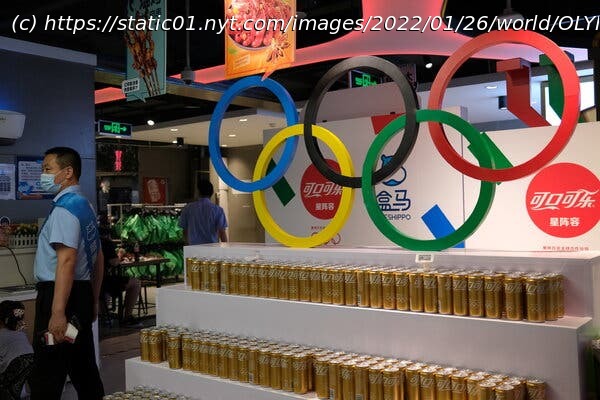Pressure is mounting on companies to condemn the country’s human rights violations, but executives say the Games should not be politicized.
At the bottom of the slope where snowboarders will compete in the 2022 Beijing Olympics, an electronic sign cycles through ads for companies like Samsung and Audi. Coca-Cola’s cans are adorned with Olympic rings. Procter & Gamble has opened a beauty salon in the Olympic Village. Visa is the event’s official credit card. President Biden and a handful of other Western leaders may have declared a “ diplomatic boycott ” of the Winter Games, which begin next week, but some of the world’s most famous brands will still be there. The prominence of these multinational companies, many of them American, has taken the political sting out of the efforts by Mr. Biden and other leaders to punish China for its human rights abuses, including a campaign of repression in the western region of Xinjiang that the State Department has declared a genocide. The Olympic sponsorship reflects the stark choice facing multinational companies working in the country: Jeopardize access to an increasingly sensitive China, or deal with the reputational risk associated with doing business there. When it comes to the Beijing Olympics, the decision has been clear. While the sponsors have faced protests by human rights activists in several countries, they have largely brushed them aside, choosing instead to keep China, and its emerging class of nationalistic consumers, happy. The companies argue that the Olympics are not political, and that they have spent hundreds of millions of dollars on deals that span multiple Games, not just Beijing’s. Collectively, the top 13 Olympic sponsors have contracts with the International Olympic Committee that add up to more than $1 billion. “They just seem to be proceeding as normal,” said Mandie McKeown, executive director of the International Tibet Network, a group that helped to organize protests by more than 200 rights groups calling for a boycott of the Olympics. “It’s literally like they’ve got their heads in the sand.” For companies, though, the risk of angering Chinese consumers by criticizing China’s policies are high. Armies of patriotic voices on Chinese social media have furiously denounced foreign brands for perceived slights, vitriol often amplified by the government and official state media. Adidas, Nike and other fashion companies faced nationwide boycotts in China after they expressed concerns about reports of forced labor in Xinjiang, the region where the Communist Party has forced millions of Uyghur Muslims into mass detention and re-education camps. When the fashion retailer H&M pledged to stop buying cotton from Xinjiang, a boycott by Chinese consumers cost it around $74 million in lost sales over one quarter. Even one of the top Olympic sponsors, Intel, faced a backlash last month after the company posted a letter calling on international suppliers to avoid sourcing products from Xinjiang.






